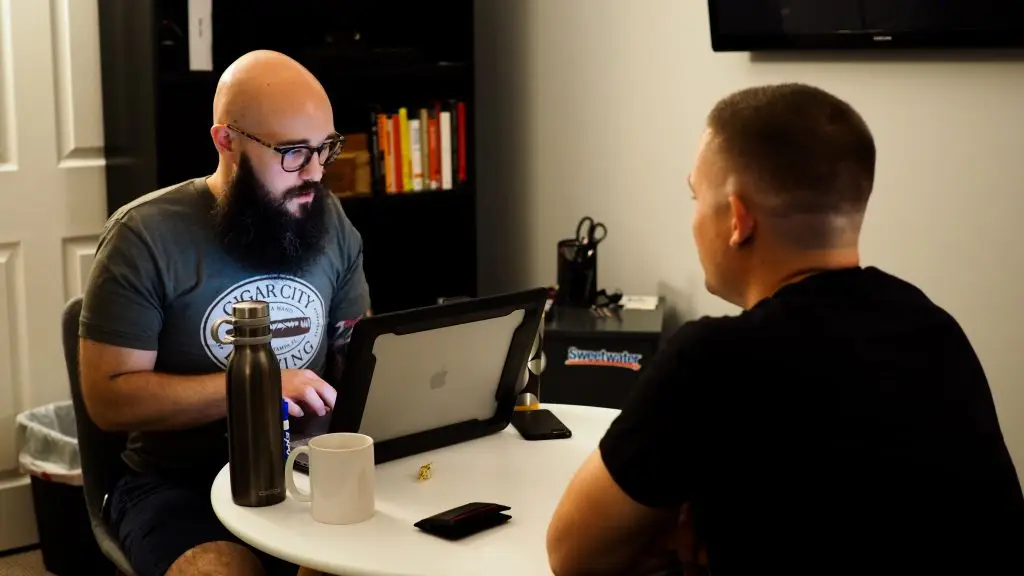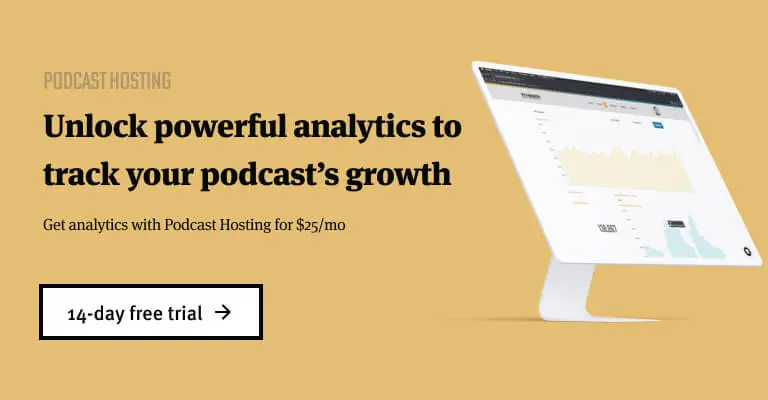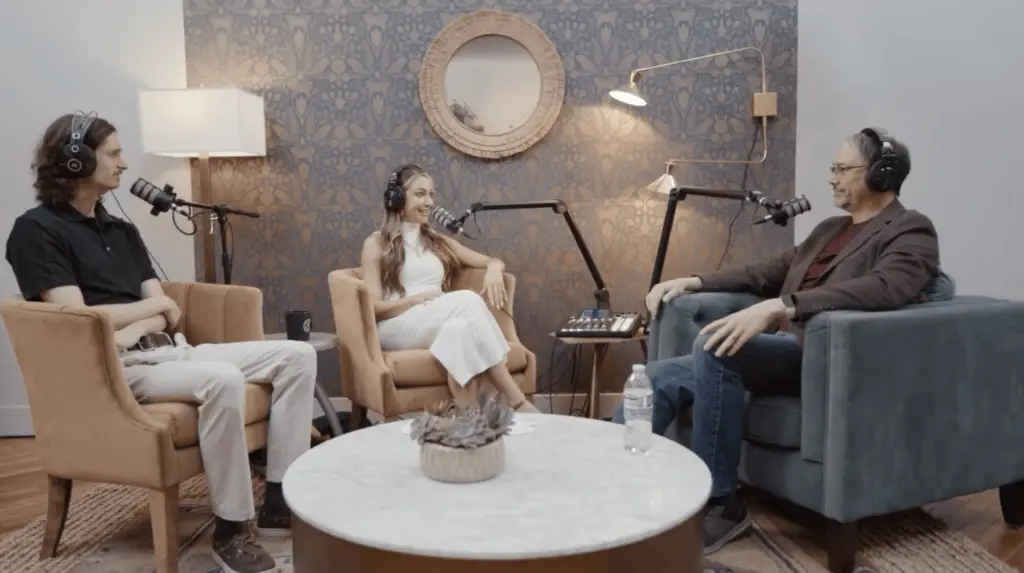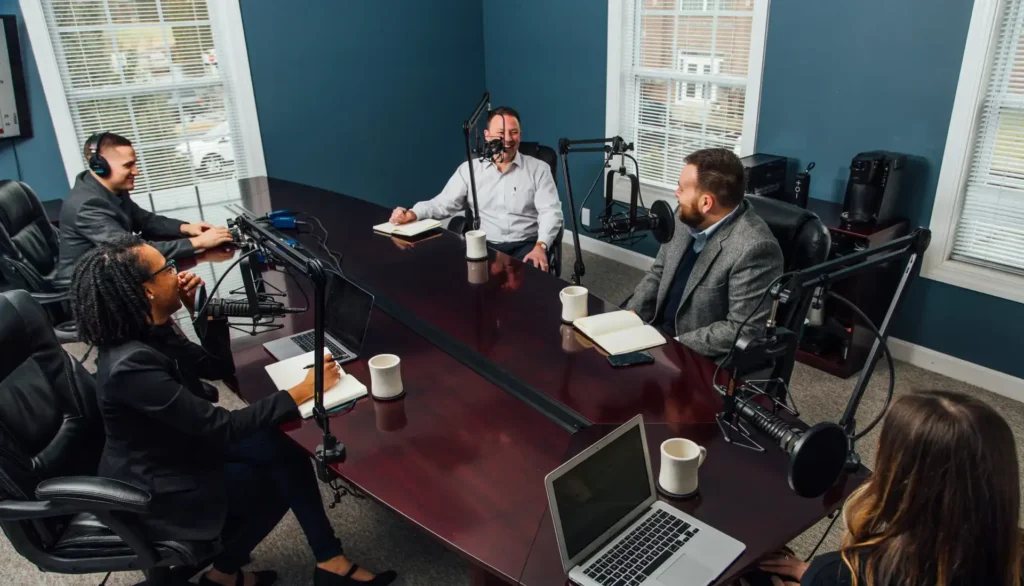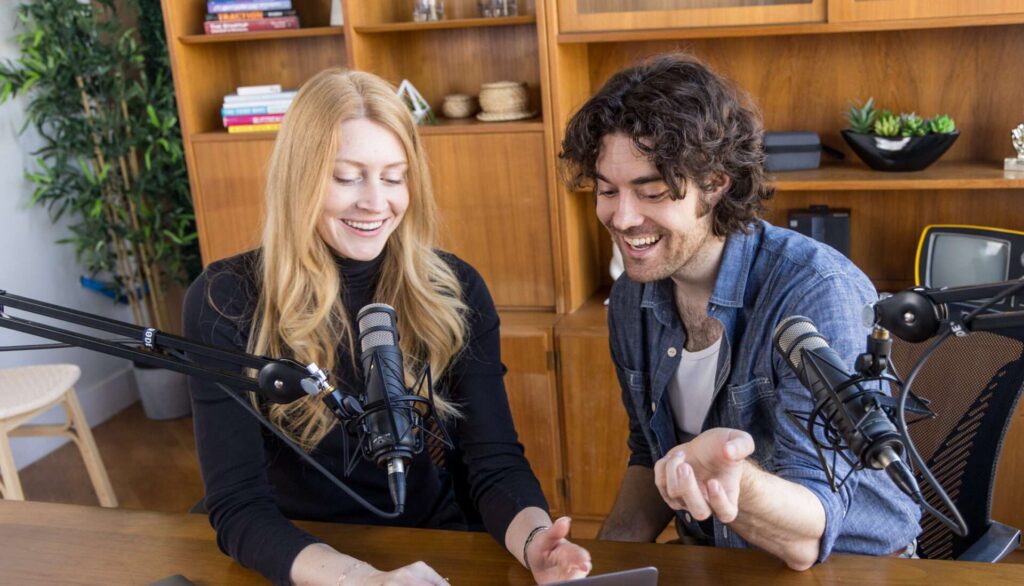Every week we have podcasters asking us how to monetize their podcast. And it’s a legitimate question. We’re living in the age of the online business. There are a plethora of ways to make money online and people are getting smarter and more creative about it all the time.
And while monetizing your podcast is something that anyone can do, there are a variety of strategies behind the scenes and the truth is that some podcasts are simply more “successful” with monetization than others. The predominant way that the top podcasts make money is through advertisements. While this is a wonderful way for many shows to run their podcast business, the barrier to entry is much higher, and so it leaves many new podcasters feeling disappointed that they can’t make any money despite the hard work they are pouring into their content week after week.
Why is this? Well think about it logistically. Advertisers want to buy airtime on podcasts that can get their name in front of a lot of people, and people who meet the general demographic for the product or service they sell. The challenge is that the variety and depth of listership advertisers want is something that many new podcasts have not established yet, so this strategy takes time to implement and many new podcasters become frustrated and discouraged. This model is known as the CPI (cost per impression) or CPM and is a strategy that requires a lot of downloads for advertisers to be interested in considering.
But there’s another way to make money through your podcast, regardless of how many or few followers you have!
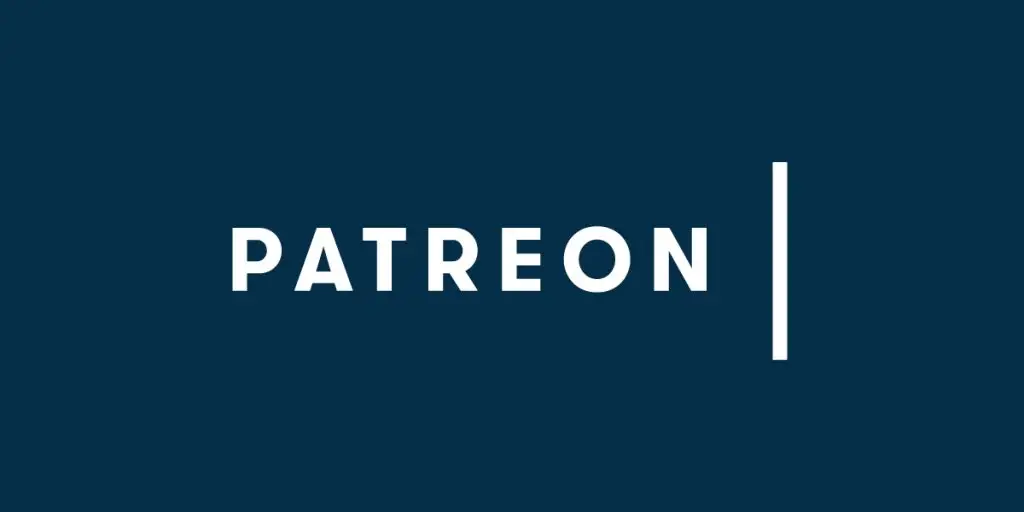
Enter Patreon, a membership platform based on the very old concept of patronage. On their YouTube trailer, Jack Conte, Patreon’s co-founder and CEO says, “Patreon exists because when creators are paid, they can create more amazing things. Things that inspire us, teach us, challenge us, things that make us laugh.”
The fundamental model for Patreon is that you exchange early release, exclusive, or ad-free content to your members in exchange for a small monthly payment from them. There are multiple tiers that you can set up, and there are a ton of ways to be creative about the kind of content you create and release exclusively on Patreon.
Why I Believe in the Patreon Model
- It adds more value to your audience
- There is no minimum amount of podcast downloads or listeners to start earning money
- No need to seek out companies to sell ads on your site
- It gives your true fans opportunity to support you
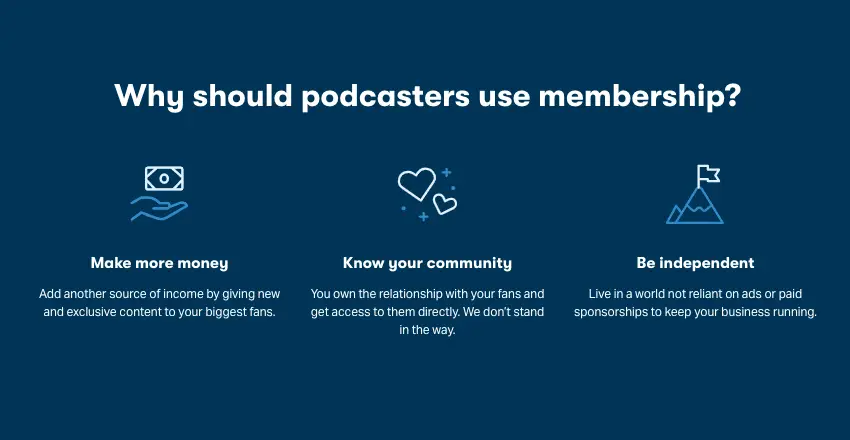
Through Patreon, creators receive direct support from their audience when they subscribe. And in exchange the audience receives exclusive content that isn’t released anywhere else. One of my personal favorite content creators is Matt D’Avella, a minimalist filmmaker whose YouTube videos have accrued around 78,316,647 views.
Matt’s main creative outlet is his YouTube channel, where he makes mini-documentary style videos talking about lifestyle design, health, creativity, and much more.
But in addition to this channel, he hosts The Ground Up Show. “A podcast about the journey.” The podcast that he distributes publicly is just a shorter version of the full-length interview, which he releases exclusively on Patreon. This is the trade that Matt offers to add value to his audiences life while simultaneously supporting himself financially.
To demonstrate the power of podcasting with Patreon, I’m going to audit his Patreon page and show you his earning potential based on his number of subscribers and membership tiers.
Matt offers his patrons three different tiers:
1. Support My Work ($4/mo)
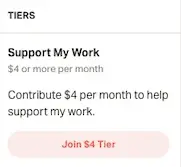
2. The Secret Podcast ($8/mo)
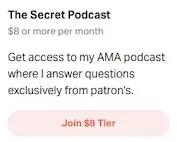
3. Exclusive Videos ($12/mo)
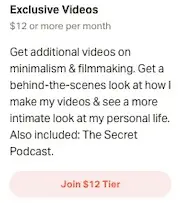
So let’s break down the numbers. We’ll use the membership tiers from Matt’s Patreon page and do some quick calculations.
As of July 8, 2019, Matt has 1,985 patrons. If each of his members was only subscribed to the lowest tier (“Support My Work”) at $4 a month, he would make $7,940 a month. That’s $95,280 a year.
I won’t even bother to put his maximum earning potential, because there are too many variables involved in gaining and losing patrons, monetization from other sources (which he has started to do very selectively), etc. But I think you’re catching my drift: there is real money to be made through podcasting on Patreon. So whether you are simply looking to have an option for covering the cost of your hobby, or your are looking to create an income stream to be enabled to do what you love on a full-time basis, the sky’s the limit.
Recommended reading: How to create a private podcast (businesses and creators)
So how do you get started? What are the logistics?
There are a couple of simple steps to setting up your Patron account.
How to Set Up a Podcast on Patreon
1. Create a new account
Not much to say about this step. To get the best results you should make sure to thoroughly fill out all of the information they request. But if you need to come back and fill in your information later that’s totally an option so no worries.
2. Build your page
To optimize your profile, follow the specific aspect ratios that they recommend for uploading your profile photo and header image. They recommend the profile picture be 256×256 and the cover photo will be displayed as 1600 x 400.
Link all of your social media accounts, or start by creating your social media accounts if you haven’t already!
Write your “About” section. This could be as simple as repurposing the podcast description that you wrote when you first created your show, or it could be a more customized overview of what kind of content you are providing to people through your Patreon.
3. Set up membership tiers
Ok, now that we’ve gotten through the more tedious setup work, it’s time to set up your membership tiers. This is where the rubber hits the road. Patreon’s whole model revolves around these membership tiers. This is how you will make money – by providing exciting exclusive content for your listeners and organizing it into specific membership tiers.
Similarly to how businesses create multiple price points for different potential customers, Patreon encourages creators to offer multiple tiers of membership. Simply put, you ought to create a low, mid, and high-end tier. This gives your fans an opportunity to support you at three different tiers.
The invisible fourth tier that exists, of course, is the free content that you are creating for your audience where you mention and promote your Patreon. For podcasters, the free content is most likely your main podcast, your social media, and any blogs or any other online content you create. This the top of the funnel that leads your fans to explore your brand more, and ultimately should lead to supporting you on Patreon.
This is the coolest part about the patronage system: it is built on the value you are already bringing to your audience. You are incentivized to make the best content possible for your audience and they are incentivized to pay you by the added value you bring them through your exclusive Patreon content.
How to Drive Traffic to Your Patreon
So now that you’ve set up your account on Patreon, how do you drive traffic to your page?
So now that you’ve (1) created a new account, (2) built your page, and (3) set up your membership tiers it’s time to drive traffic to your Patreon page.
Here are a couple of simple ways to find Patrons for your show:
- Reference the URL to your Patreon in your podcast intro and outro
- Link Patreon on all your social media bios
Make an Intro Video explaining what content you are offering to people exclusively on Patreon (here’s an amazing example from Matt D’Avella that he put on YouTube and his Patreon home page)
For more ways to boost membership to your Patreon channel, check out the resources on Patreon’s blog and YouTube channel. They seem to genuinely care about their creators. It’s clear in the business structure and mission of the company, and it’s even clearer watching their resources on YouTube like this video, “How to grow your membership on Patreon.”
5 Strategies for Podcasting on Patreon
1. The Early Access Podcast
With this strategy you create your normal podcast but upload it to Patreon exclusively either one or two weeks ahead of the official release date so that your patrons are the first people to have access!
Narrative and fictional podcasts with strong cliffhangers at the end of their episodes lend themselves well to this strategy. The stronger your cliffhanger and the more interesting your content for the following weeks is, the more this tier is going to appeal to potential patrons.
In order to execute the strategy effectively, make sure to tell your listeners at the end of each episode that patrons get early access to the next episode, and consider including a snippet or trailer from the next episode at the end of your current episode.
Warning! This strategy requires that you stick to a content creation schedule and put hard and fast deadlines on yourself. But the value of what you are giving your patrons and the money you will make as a result is definitely worth it!
2. The Ad-Free Podcast
If your podcast has ads, there are two different ways to go about the ad-free podcast strategy.
First, include ads in your standard show that is distributed on all of the podcast directories, and then tell your listeners at the beginning and end of the show that you offer an ad-free version of the show that is available exclusively on Patreon.
Second, you can keep all of your content ad-free across all platforms, and tell your listeners that the reason you have made your content ad-free is because of the generous support of your Patreon members.
The first ad-free strategy lends itself to more potential income as you get income from advertisements plus your Patreon members, but keeping all of your content ad-free across the board can also garner a lot of respect from your listeners.
Let’s be honest, in 2019 everybody is constantly being sold to by influencers and content marketers alike, so I think the best strategy is to show your listeners how much you value their time, regardless of whether they are already patrons, and keep all of your content ad-free. Show them that you want to add genuine value to their lives, and many of them will be happy to send you $5, $10, or $20 a month!
3. The Secret Podcast
The third strategy I have observed some podcasters doing on Patreon is creating a separate (and less formal, more behind-the-scenes) podcast exclusively for their patrons.
Genuine relationships with your listeners are the name of the game. You are creating a community around your podcast. Patreon channels are really acting like Facebook groups, where fans can speak directly to the creators they love, ask them questions, and receive shoutouts.
Here are several content ideas for your Secret Podcast:
- Patron Q&A – shoutout your listeners and answer their questions
- Share exclusive stories about your personal life
- Exclusive interviews with family, friends, or guests that you had on the show
4. The Bonus Podcast
I first observed this strategy on Matt D’avella’s The Ground Up Show podcast while listening to his interview with Ramit Sethi. They were having a conversation about personal finance, and after about an hour of conversation, Matt came in with a voiceover saying that I could hear the last part of their conversation by signing up on his Patreon. Then he proceeded to break down the talking points that are covered in the bonus content of the interview.
This technique that he was using is a crucial concept at the core of the Patreon membership model: you have to add real value to people’s lives so they become members. Make sure to include a clear CTA in the outro of your show, and raise the stakes by telling people exactly what exclusive content they will get immediate access to if they sign up to be a member!
Here are several content ideas for your Bonus Podcast:
- Unlock the last 30 minutes of the episode for your patrons
- Share behind-the-scenes conversations with your interviewee
- Ask an interviewee questions directly from your Patrons – drop a post on your Patreon page the week before your interview so that your patrons can submit their questions
5. The Executive Producer Role
Another great option for positioning Patreon to help you make money is to let your patrons collaborate with you. With this strategy, you can give your listeners the opportunity to help craft your content and offer them a shoutout on your show’s intro and/or outro.
What’s Good Games, a video-game commentary podcast, offers this shoutout to their listeners on their first week of becoming patrons.
This strategy could become as robust as a video conference call with your patrons where you brainstorm content, write a story, and get their feedback or as simple as shouting out your patrons in the intro of your show just to show them some love. It’s a brilliant strategy that allows you to connect with your patrons and become more than just another podcaster to your audience.
6. Write Your Patrons Into the Podcast (Bonus Strategy)
This strategy works marvelously for fictional podcasts. Write your patrons into the story, telling them who the character is and what their role will be, but leaving the ending open to build some excitement as the story develops. I first heard about this strategy from Adam Cecil of the Night Vale Podcast at Podcast Movement 2019 when he was on a panel about monetizing through membership.
This strategy, according to Adam, was often a great gift for people to give to others who were avid listeners of the podcast. I mean, what cooler than to hear your own name in your favorite podcast?!
Hopefully, this list has gotten your wheels spinning on how to creatively approach membership monetization of your podcast on Patreon. I believe that creativity and authenticity are two crucial ingredients in crafting a successful Patreon platform for your podcast or brand. By offering your fans something creative and novel, and by showing up as your authentic self, flaws and all, you will create a strong community around the mission of your podcast. Oh, and you’ll also make some money podcasting, which is a nice bonus!
Conclusion
How has Patreon been working out for you? If you’re a creative on Patreon I’d love to connect with you and learn what strategies and lessons you’ve learned along the way as I continue to research and educate myself on how to successfully use the Patreon platform! Chat with our team below or schedule a call today!
Until next time, keep creating!
